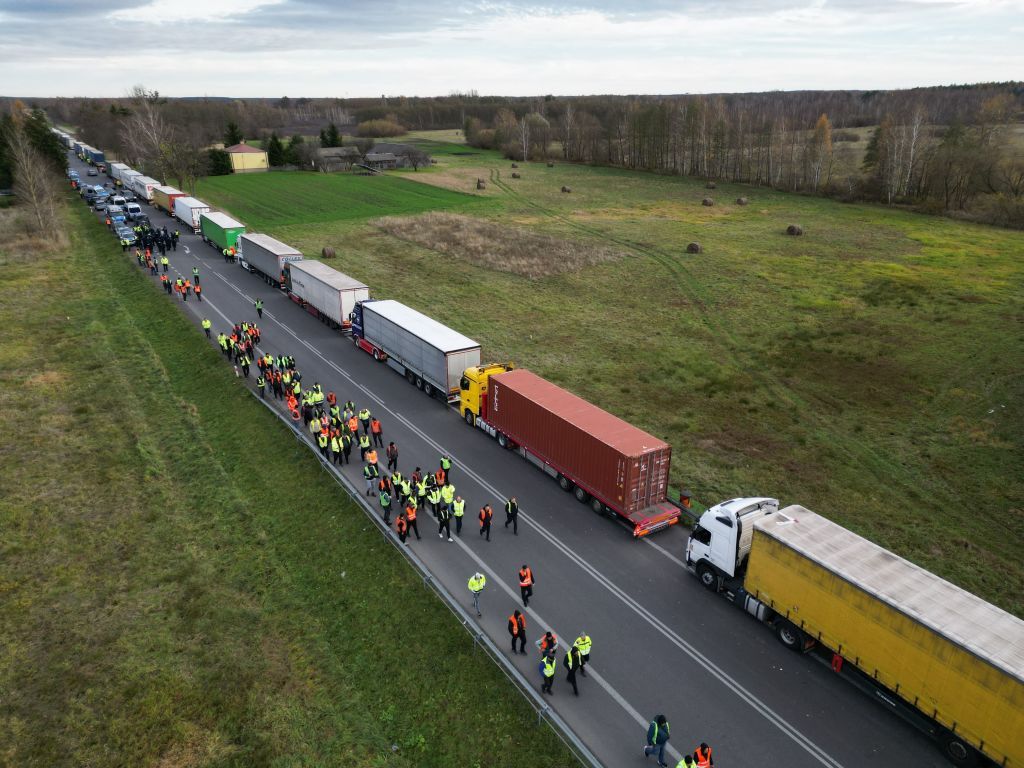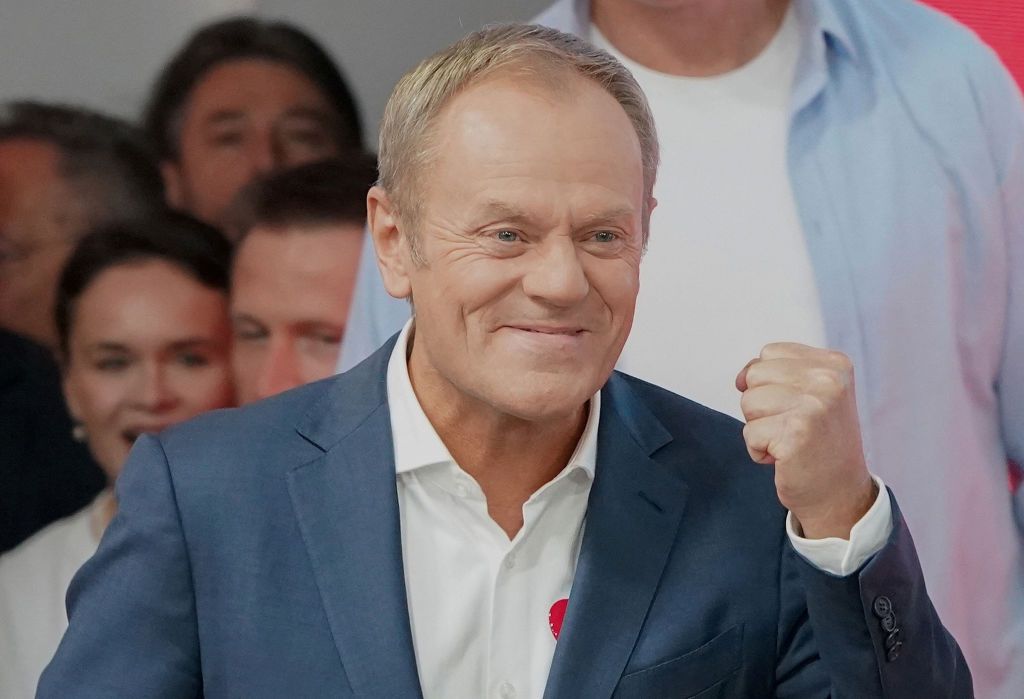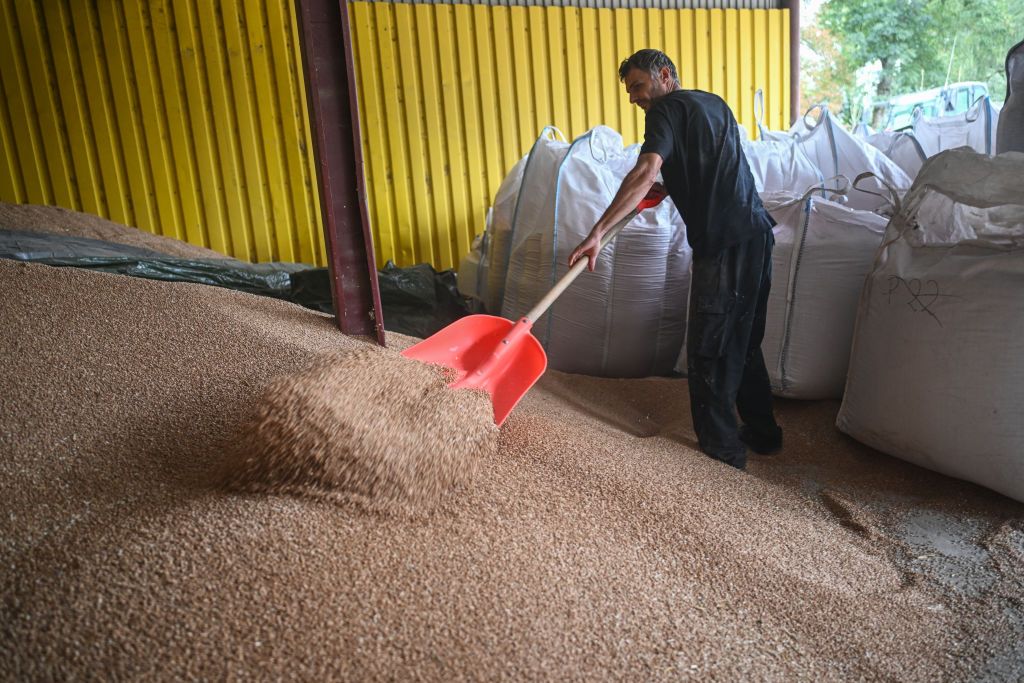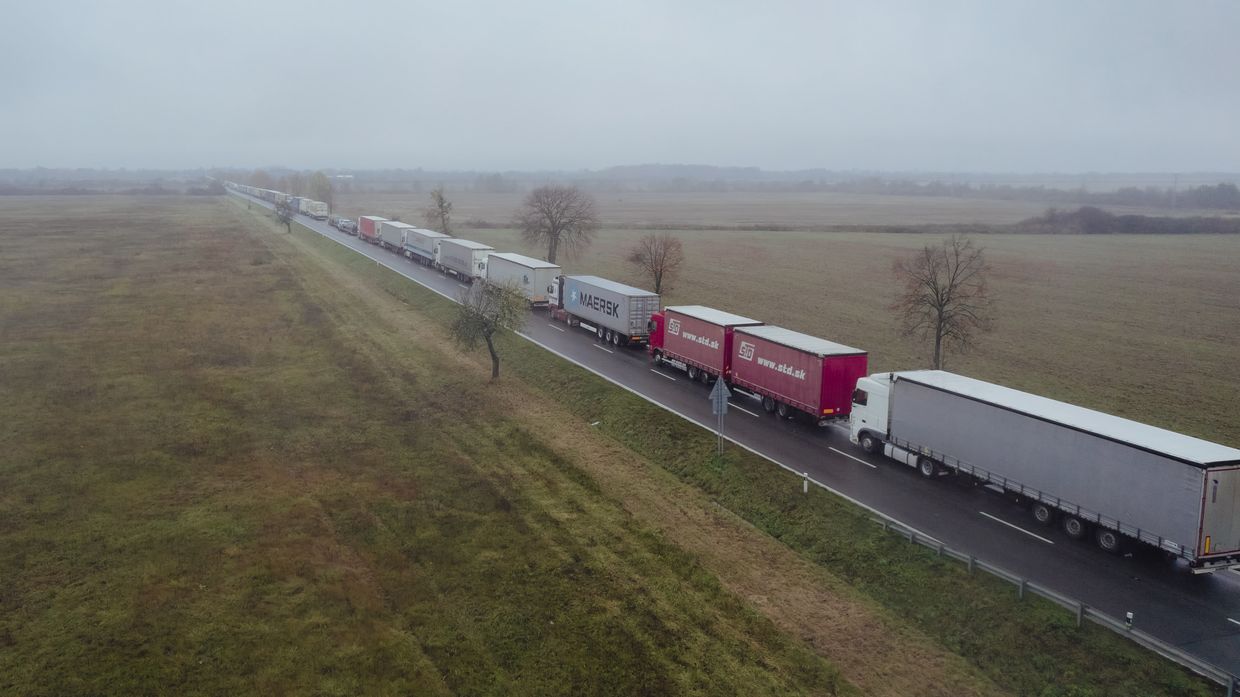Trucker protests: Unraveling the standoff between Polish and Ukrainian haulers

As Polish protests blocking three major Poland-Ukraine border crossings stretch into their third week, negotiations to bring an end to the blockade have all but failed.
Exhausted drivers are stuck in massive lines on both sides of the border, with expected waiting times reaching over one month at the Yahodyn – Dorohusk crossing, according to the electronic service, eCherha. Kyiv on Nov. 19 sent a humanitarian team to the border to provide food and water to truckers.
As temperatures plummet below freezing, tensions are boiling over. Adamant protestors belonging to the Committee for the Defense of Carriers and Transport Employers (KOPIPT) are threatening to carry out the blockade until Jan. 3, 2024, demanding a limit on the number of Ukrainian drivers entering Poland.
Polish truckers complain that the high number of Ukrainian drivers entering Poland are hauling goods from Poland to other countries, undercutting local businesses that cannot match cheaper Ukrainian prices.
Ukrainian officials and industry representatives vehemently deny the accusations.
Ukraine’s Ambassador to Poland Vasyl Zvarych has called the protests a “stab in the back,” while Volodymyr Balin, Vice President of the Association of International Car Carriers of Ukraine (AsMAP) told the Kyiv Independent that he is “categorically against the fact that we are undermining local businesses in Poland.”
Prior to Russia’s full-scale invasion, Ukrainian drivers had to apply for permits to enter EU countries. Brussels suspended transport permits last year until June 2024 as part of the Solidarity Lanes Initiative to help Ukraine’s struggling export industry after Russia blocked Ukraine’s Black Sea ports.
The protesters' key demand is that the EU reinstate permits. Although this currently seems unlikely, the protestors appear inspired by the success of protests by Polish farmers earlier this year that saw Brussels impose a temporary ban on the import of Ukrainian agricultural goods in five EU countries.
A quick resolution appears unlikely. As the Ukrainian side repudiates the Polish protestors' complaints, analysts in Poland say that there is likely broad support for reinstating EU permits and restoring a level playing field.

Protest organizers
One of the key figures in the blockade is Rafal Mekler, the leader of a protest in the border town of Dorohusk, and a member of the Confederation of Liberty and Independence Party in the Lublin region.
The party consists of members who have expressed anti-Ukrainian and Rusophillic stances and are the most prominent backers of KOPIPT. Confederation founder Janusz Ryszard Korwin-Mikke recognized Russia’s illegal annexation of Crimea in 2014 and last year rallied against sanctions on Russia.
Mekler himself has business ties to Russia and Belarus. He previously participated in a much smaller and short-lived blockade on the Dorohusk checkpoint in May. Mekler did not reply to the Kyiv Independent’s request for a comment.
In light of this connection with the Confederation party, Ukrainians in the transport industry have called into question the legitimacy of the protests.
Balin claims that the protests are primarily led by Mekler’s association to put pressure on Ukraine’s economy. Ukrainian haulers are already losing 300 euros a day waiting at the checkpoints, he told Ukrainian Radio.
The blocked checkpoints are important for the export of Ukraine’s agricultural products. The three crossings account for a quarter of oilseed and grain export by road, according to Ukrainian investment platform Dragon Capital.
Balin also believes that there are divisions among the protestors. He noted that AsMAP attended negotiations on Nov. 13, in which Ukraine proposed solutions to improve the logistics on the border, with protestors split between those wanting to resolve the practical issues and those wanting to carry on the blockade.
Increased Competition
While Mekler’s association may be the most vocal critic of Ukrainian haulers, many Polish companies are likely to share the same sentiment as KOPIPT, according to Sebastian Stodolak, vice-president of the Warsaw Enterprise Institute think tank.
“It is difficult to estimate from available data how many trucking companies (KOPIPT) brings together. However, it can be assumed that most companies share its demands,” Stodolak told the Kyiv Independent.
“The protesters' demands boil down to restoring the system of protection of the EU's internal market against external competition. Referring to the need to introduce fair rules, a level playing field, and symmetry in relations with Ukraine is very appealing to citizens.”
Polish companies have dominated the European transport market for years and tensions with their eastern neighbor are nothing new.
Since Kyiv signed the Free Trade Agreement in 2016, road transport between Ukraine and the EU increased by 42%. As such, Poland faced heightened competition from cheaper Ukrainian haulers.
In response, Warsaw reduced the number of new transport permits issued to Ukrainians year by year from 10,000 in 2019 to zero in 2021, according to the Ukrainian think-tank Better Regulation Delivery Office.
Now, competition has increased again. Following Russia’s Black Sea blockade, road transport has become even more crucial for Ukraine’s exports and imports, with Poland as the main artery.
So far this year, Ukrainian trucking companies conducted 880,000 crossings into Poland, a drastic increase from the 180,000 crossings that were made annually before the full-scale war.
Balin also points out that Polish transport companies have had to scale back operations in Russia and Belarus, losing work and income. Mekler himself owns a transport company that transported goods to the two countries.
Amid this shrunken market, the protestors claim that Ukrainian drivers further undermine local businesses by transporting goods from Poland to third countries.
However, Balin explains that while Ukrainian drivers can freely enter Poland, they still need to apply for permits with the European Conference of Ministers of Transport (ECMT) to carry goods from one European country to another: for example from Poland to Germany.
“There are not that many of those (permits) for Ukrainian truckers to create any real kind of competition,” Balin said.
While the number of ECMT permits given to Ukrainians has increased since the start of the invasion, according to data from the International Transport Forum, Balin noted that Ukrainian drivers have not used up all their allocated permits.
Additionally, with Russia imposing bans on ECMT permits, Ukraine has taken permits once granted to Russian drivers, according to Balin.
It is also unlikely that Ukrainian transport companies are willing to risk the consequences of operating without valid ECMT permits.
“We have been repeatedly inspected in Poland and Romania. Perhaps such cases are due to a lack of knowledge, but I am sure that they are rare and do not happen again, because there is no financial sense in spending your small earnings to pay fines,” said Anastasiia Stupaienko, director of the Academy of International Transportation.

New dynamics
Before the full-scale war, the vast majority of road transport between the neighboring countries was carried out by Polish companies that employed some 105,000 Ukrainian drivers.
Now, tens of thousands of Ukrainian drivers have returned to their homeland, according to the Association of International Road Carriers in Poland. Not only has this resulted in labor shortages, but Polish companies now cannot send Ukrainian drivers who remain in Poland to Ukraine as martial law prohibits men of conscription age from leaving the country.
To combat this, the protestors demand Poland join Ukraine’s “Shlyakh" system that allows male Ukrainian drivers to leave the country as long as they return within 60 days. Polish companies would then be able to send their Ukrainian drivers across the border.
But this is a requirement that is “impossible to fulfill,” Deputy Minister of Infrastructure Serhiy Derkach told Ukrainian media Ukrinform in an interview.
“During martial law, our men cannot safely travel abroad, work for foreign companies, whether in Poland, Germany, or elsewhere, and travel between Ukraine and these countries. And if we are speaking for drivers, this is a discriminatory rule against other men who work for foreign companies and have restrictions on traveling abroad," Derkach explained.
Moreover, while Polish truckers are still able to enter Ukraine freely, many Polish companies are hesitant since they cannot insure their drivers. Transport to Ukraine has dropped significantly as a result, while Polish haulers that do enter Ukraine often do not export goods back to Poland.
“Polish drivers carry goods closer to the border in Ukraine: Lviv, Lutsk, Kovel; and drive back empty. The fact is that cargoes need to be taken not from the border regions but from more dangerous ones and Poles don’t want to do it,” Commercial Director of RivneTransService Oleg Yatsuk told the Kyiv Independent.
Ukrainian drivers, on the other hand, are hauling goods back and forth between Ukraine and Poland, even carrying goods from frontline cities like Zaporizhzhia and Nikopol. Therefore, Ukrainians have taken up the market share simply because of the circumstances of the war, Balin said.
Escalating Tensions
Meanwhile, fears that the protests will spread beyond Poland have also emerged. Members representing the road transport industry in Slovakia, Hungary, Czechia, Lithuania, as well as Poland, released a joint statement on Friday addressed to the EU.
“Suspension of bilateral permits management has caused a massive increase of transports within the EU operated by non-EU truckers,” the statement reads.
“Hereby we ask and urge all decision makers involved to consider termination or significant changes to the current EU-Ukraine arrangement without any delay and thus enable a return to the implementation of bilateral agreements of the single EU countries with Ukraine.”
The European Commission said on Nov. 16 that reinstating the permits for road transport from Ukraine would violate its current agreement with Kyiv. It has also threatened to penalize the Polish government for not doing enough to stop the unlawful blockade.
Warsaw is also currently grappling with the challenges of forming a new government after the ruling Law and Justice Party (PiS) failed to gain a majority last month. Negotiations are underway and the leader of the pro-EU opposition coalition, Donald Tusk, is likely to become Prime Minister.
Efforts to end the blockade during this transitional period are challenging without solid governance in Poland.
“Polish politicians are too busy creating a new government to focus on this issue particularly closely. Important decisions will probably be made in December,” Stodolak said.
“It can be assumed that the new government will want to find some kind of amicable solution, but it will certainly not ignore the voice of Polish carriers.”















